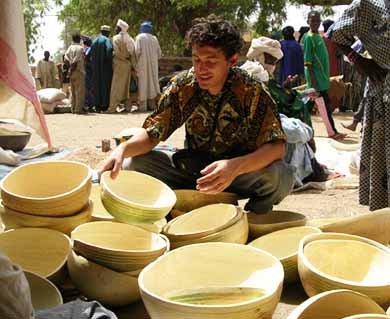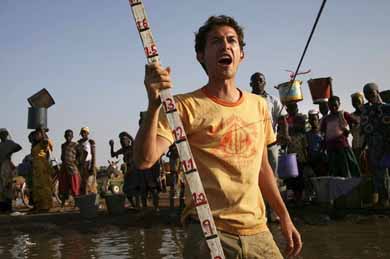As bets go, odds are good that Dante Vasquez is the only honorary Ghanaian chief living in Las Vegas. As such, the ’03 grad is director of operations at Organizing for America in Nevada, where he is supporting President Barack Obama’s re-election campaign.
Sin City is the latest stop on Vasquez’s mission to “burn bad karma on a diplomatic level,” which began soon after he collected his degree in political science. Vegas was not exactly on his radar at that time—instead he’d opted for global adventure, trekking through Bangkok, backpacking across Asia, and learning Chinese.
Ultimately he found his way to Africa and honorary chiefdom as a warrior fighting to eradicate disease in Ghana and Sudan. “He knows he needs to give back to the world more than he takes,” says Jim Secreto, a friend and fellow U-M alumnus, who met Vasquez as a freshman in West Quad. Together, they’ve road-tripped across the U.S. as well as through Tibet.
The long, strange trip
The road to political organizer began in the West African country of Burkina Faso, where Vasquez stopped to visit his friend Michael Humes, a Peace Corps volunteer. There, he encountered both a cause and an organizational challenge that would change his life. On a side trip to Mali he and Humes met a director from the Carter Center, the Atlanta-based humanitarian organization founded by former President Jimmy Carter and former First Lady Rosalyn Carter. Vasquez was inspired by the Carter Center’s efforts to eradicate the horrific water-borne parasite known as Guinea worm from the local population.
The parasite is transmitted by ingesting water from ponds harboring a flea that carries the worm’s larvae. As it matures, the female Guinea worm, which can grow to three feet long and the width of a piece of spaghetti, burrows through the host’s muscles and around bones, ultimately emerging through a skin blister approximately one year after ingestion. There are no successful medicines or vaccines, and the excruciatingly painful removal process can take months.
Motivated to make a difference, Vasquez moved to Ghana in 2006, where he worked as the Carter Center’s technical adviser for the country. For more than two years, he lived side by side with local villagers, doing everything possible to eradicate Guinea worm, from working with patients on managing individual cases to supervising a network of volunteers and paid staff in five districts endemic with the disease. Program volunteers assisted with disease surveillance, reporting cases or suspect cases before the worms emerged, in order to break the cycle of transmission.
Leading by example
“Dante leads by example and always tries to encourage and motivate his teammates,” says Humes, who first met Vasquez when they ran on the cross-country and track teams at Ann Arbor’s Pioneer High School. (Years later Humes would help treat Vasquez’s first bout with malaria.) “He does not believe that he can’t do the dirty work because he is in charge, or is the boss. He commits his energies to help people succeed, not only for the goal of the organization but as a person and in life.”
Those energies paid off: In July 2011 the Ghanaian Ministry of Health declared the country free of Guinea worm. Ghana is the latest country to rid itself of the disease, which is expected to be the second human disease eradicated in history. Smallpox was the first. For his efforts, Vasquez was given the honorary title of Nana Kwadzo Nkosuo Hene, loosely translated as “development chief” in the Ewe language.
“More often than not,” says Vasquez of his time in Ghana, “I was trying to have my team take the lead, especially once we got down to the village level. I really learned the value of humility—the value of being able to influence people to get things done.”
“This time it was more intense”
Vasquez returned to the U.S. for a couple months. But with memories of Ghana still fresh in his mind, he was compelled to return to Africa with the Carter Center in December 2008. This time he was based in Sudan, considered the “last frontier” on the road to Guinea worm eradication.Here, the situation was “more intense,” says Vasquez.
After completing additional field work, he was promoted to deputy director, a position that included more operations responsibilities and behind-the-scenes work. Because of the country’s poor and chaotic economy, everything from fuel and water filters to bikes and trucks had to be brought in—from Kenya or Uganda—often accompanied by escorts from the Sudan People’s Liberation Army.

Vasquez eats breakfast after spending the night at the local granary in the rural Burkina Faso village of Darkoy. (Photo by Michael Humes.)
“Sometimes our vehicles would get shot at,” Vasquez says. “There were consistent deaths due to tribal violence. There was this undercurrent of violence and it was just really unpredictable.”One day, while working in Jongolei state in the Eastern part of South Sudan, Vasquez saw a few dozen men armed with new guns, satellite phones, and Wellington boots. They were mercenaries from the North. That night, he heard gunfire.
When the sun came up the next morning, he turned on his little wind-up radio and heard a BBC report that hit all too close to home. In the neighboring village—plagued by Guinea worm—people had been killed. Vasquez had been there just the day before.
As he walked through the village to the airstrip from where he would depart, Vasquez passed grieving women and children.
Hail to the chiefs
In 2010 Vasquez returned to Ann Arbor to work for U-M’s Institute of Social Research, supervising data collection for the largest study to date of suicide and mental health in the military. He was on the road about two weeks a month, visiting Army bases across the country and meeting soldiers.
In 2011 he turned his attention to the presidential election and wondered how he could contribute. He sent a short email to barackobama.com in his simple, direct, and to-the-point style: “I ran operations in Sudan, I can probably do it in Nevada for the campaign. I’m willing to quit my job and move to where I’m needed and work 16 hours a day to re-elect the president.”
A couple weeks later, the honorary Nana Kwadzo Nkosuo Hene found himself in Las Vegas. As director of operations for Organizing for America in Nevada, Vasquez does everything he can to support local volunteers, from setting up campaign offices and managing budgets to ensuring that voter registration events are supplied with the necessary resources.
The real Las Vegas is a far cry from the Oz-like glittering skyline of the Strip. Many of the urgent issues at play in the 2012 presidential campaign—housing, unemployment, immigration—dominate the conversation in Nevada. The greater Clarke County area, which includes Las Vegas and nearly three quarters of Nevada’s 2.7 million people, has one of the highest unemployment rates in the country.
Similarities in service
Vasquez finds a host of similarities between his political work with Organizing for America and his public health efforts on behalf of the Carter Center. It’s all about empowering people, he says.
“We were really trying to get people in the host countries—both Ghana and Sudan—to take initiative and ownership of the program,” he says. Similarly, Organizing for America is “supporting people who are organizing in their communities; organizing their neighbors around issues that they have in common, and care about together, that affect them as citizens of Nevada. It’s about letting them know that they can affect their communities and the direction of this country.”
Whether he’s working to eradicate disease in a faraway country or striving to re-elect a president here at home, Vasquez is inspired by others who share his passion.
“When I see one of my colleagues in the office, hustling on the phones, that’s what makes me stay late at night and pore over the budget,” he says. “I definitely understand where I fit in to the larger picture and how I’m contributing.
“Working for the Obama campaign certainly is unlike anything I’ve ever done,” he adds, “but so was Guinea worm.”





